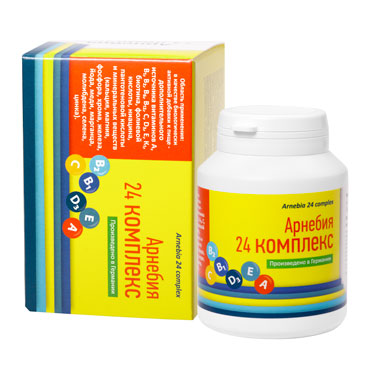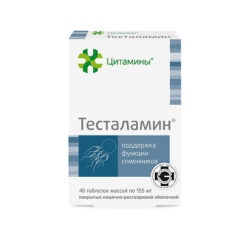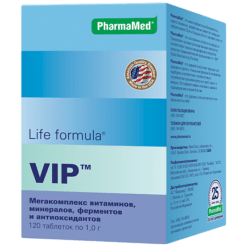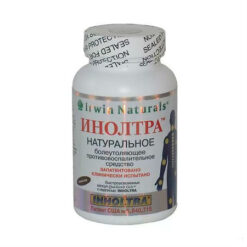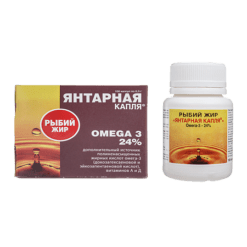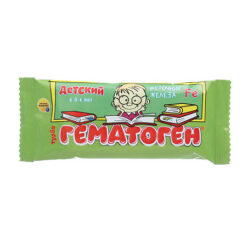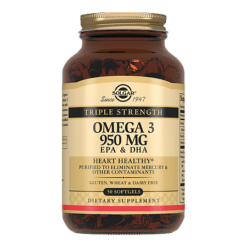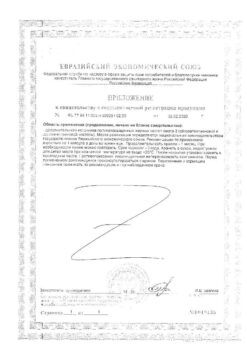No products in the cart.
Arnebia Complex 24 tablets, 100 pcs.
€1.00
Out of stock
(E-mail when Stock is available)
Description
Vitamin A is essential for normal growth and development. It can improve vision, ensures the effectiveness of the immune system. Vitamin A is recommended for improving the health of epithelial tissues, including the mucous membranes of the digestive system, lungs, genitourinary system and skin. Additionally, it has antioxidant activity. Vitamin A is useful for the brain and nervous system and has a positive effect on the ability to learn.
Vitamin B1 (thiamine) improves blood circulation and is involved in the process of hematopoiesis, carbohydrate metabolism and the production of hydrochloric acid, which is important for proper digestion. Thiamine optimizes cognitive activity and brain function. It has positive effects on growth and development, learning ability, gives energy, and normalizes appetite. Thiamine is essential for proper muscle tone of the intestines, stomach and heart. Vitamin B1 is also an antioxidant that protects the body from aging, the negative effects of alcohol and smoking.
Vitamin B2 (riboflavin) is essential for the formation of red blood cells, antibody production, cellular respiration and growth. It helps relieve eye fatigue and is important in the prevention and treatment of cataracts. Riboflavin aids in the metabolism of carbohydrates, fats, and proteins. It has become popular as a treatment for migraines and headaches. One theory for migraines is insufficient activity of brain cells. Riboflavin is an essential factor in the production of energy by cells. It is also involved in the formation of nicotinamide in the body.
Vitamin B6 (pyridoxine) is involved in the synthesis of nucleic acids (RNA and DNA), which contain genetic information for cell reproduction and normal cell growth. It activates many enzymes, helps the formation of red blood cells and antibodies, and helps maintain sodium-potassium balance in the body. The nervous system and brain need vitamin B6 to function properly. In addition, pyridoxine can prevent arteriosclerosis, reduce the risk of cardiovascular disease and alleviate PMS.
Vitamin B12, in tandem with folic acid, is involved in many biochemical processes in the body, such as cell division and the formation of the myelin sheath of nerve cells. Thus, it is responsible for growth and development and also protects our nervous system. Vitamin B12 gives the body strength and energy, alleviating various conditions such as chronic fatigue syndrome, asthma, depression, multiple sclerosis, shingles.Vitamin B12 is important in reducing homocysteine levels, a substance that increases the risk of heart disease. It participates in the formation of red blood cells and helps the absorption of iron. Vitamin B12 is associated with the synthesis of acetylcholine, a neurotransmitter responsible for memory and learning. It prevents neurological changes that occur with age.
Vitamin C is an important antioxidant that protects cells and cholesterol from oxidative damage. It helps restore vitamin E in the body and can increase levels of glutathione, another powerful antioxidant. All this prevents premature aging of skin cells, cataract formation and many other negative effects of free-radical oxidation. As a true antioxidant, vitamin C is important in reducing the risk of heart disease and atherosclerosis. It is essential for the production of collagen, an important component of connective tissue, bones, and blood vessels. And of course vitamin C is essential to the immune system for its proper functioning. It is concentrated in the white blood cells, increasing their activity, vitamin C establishes the response of antibodies. It helps in the production of anti-stress hormones and interferon.
Vitamin D3 (cholecalciferol) is synthesized in the skin in response to exposure to the sun’s ultraviolet rays. Of all the forms of vitamin D, cholecalciferol is considered its natural form. Vitamin D is essential for the absorption and utilization of calcium and phosphorus. It is essential for growth, and is especially important for the normal growth and development of bones and teeth in children. It protects against muscle weakness and is involved in the heartbeat. Vitamin D is also important for the prevention and treatment of breast and colon cancer, osteoarthritis, osteoporosis, hypocalcemia, strengthens the immune system and is necessary for the normal functioning of the thyroid gland and blood clotting.
Vitamin E as an antioxidant prevents cell damage in the suppression of lipid oxidation and the formation of free radicals. It protects other fat-soluble vitamins from oxidative damage and promotes the utilization of vitamin A. Vitamin E protects low-density lipoproteins from oxidation and thus the body from developing cardiovascular disease. Vitamin E is important for reducing inflammation and muscle pain during vigorous exercise. It also prevents platelet aggregation and activates the immune system. Vitamin E is important for people suffering from specific diseases such as Alzheimer’s disease and diabetes, as well as for people prone to eye disease.
Vitamin K1 is necessary for the synthesis of prothrombin, which is necessary for blood clotting. It is also important for bone formation and repair, and helps prevent osteoporosis. It can protect the vascular system from the accumulation of calcium salts in the arteries.
Biotin (vitamin H) promotes cell growth and development, the production of fatty acids, is involved in the metabolism of carbohydrates, fats and proteins, as well as the utilization of B vitamins. Biotin is essential for the health of hair and skin, prevents hair loss in men. Contributes to the normal functioning of sweat glands, nerve tissue and bone marrow. It is known that biotin is produced by a group of friendly bacteria living in the gut Bifidobacterium bifidus. Therefore, in the case of biotin deficiency, it is also recommended to take probiotic supplements containing this beneficial bacteria. Biotin helps with seborrheic dermatitis in newborns and may be useful to improve blood sugar control in diabetes.
Folic acid is important for brain function and is necessary for older people with memory problems. It also supports the body in case of depression. Folic acid prevents the accumulation of homocysteine, so it reduces the risk of heart disease in people with a genetic predisposition. Maintaining a low concentration of homocysteine helps to prevent osteoporosis. One important function of folic acid should not be overlooked: the prevention of neonatal neural tube defects (incomplete development of the spinal cord and/or brain) and the formation of a cleft palate (cleft palate).
Niacin (nicotinamide, vitamin PP) is one of the most effective cholesterol-lowering agents, thus improving blood circulation. Niacinamide is necessary for healthy skin, it supports the nervous system, participates in the metabolism of carbohydrates, fats and proteins and in the production of hydrochloric acid, important for proper digestion. Nicotinamide is involved in the secretion of bile and gastric fluids, as well as in the synthesis of sex hormones. Important in various mental illnesses, nicotinamide enhances memory.
Pantothenic acid (vitamin B5) helps the adrenal glands to produce the necessary amount of stress hormones, allowing the body to successfully survive stress and manage chronic stress. Pantothenic acid relieves fatigue, increases the body’s stamina, and even relieves allergy symptoms and prevents some forms of anemia. It also helps convert fats, carbohydrates and proteins into energy and is involved in the formation of antibodies and neurotransmitters. Pantothenic acid is necessary for normal functioning of the gastrointestinal tract and may be useful in combating depression and anxiety.
Calcium is vital for the formation of strong bones and teeth and for maintaining healthy gums. It is responsible for regular heartbeat and transmission of nerve impulses. Calcium lowers cholesterol levels and helps prevent cardiovascular disease. It is required for muscle growth and contraction.
Magnesium is involved in various enzymatic reactions, including energy production, lipid and protein synthesis, nerve impulse conduction, muscle contraction and relaxation, bone formation, it helps regulate calcium metabolism. Magnesium is essential for the cardiovascular system, it is required for cardiac activity and to relax the walls of blood vessels, so blood pressure is reduced. 60% of the body’s magnesium is in the bones, about 27% is in the muscles, and the rest is distributed in the blood and tissues.
Phosphorus is necessary for vital processes in the body: for blood clotting, bone and teeth formation, cell growth, heart muscle contraction, normalization of heart rhythm and kidney function. It also aids in the absorption of vitamins and the conversion of food into energy. The balance of magnesium, calcium and phosphorus in the body must be maintained at appropriate levels at all times for normal body function.
Chromium aids in the absorption of glucose into the cells so it can be converted into energy. The hormone insulin is known to be the substance primarily responsible for transporting glucose into cells, but when combined with chromium, the hormone’s function of delivery is better. In addition, chromium optimizes the ability of cells to metabolize carbohydrates.
Iron enables red blood cells to carry oxygen to the cells and is involved in the production of hemoglobin and myoglobin. It is also involved in various enzymatic reactions, one of which is energy production. Iron is very important for growth and is essential for the health of the immune system.
Iodine helps metabolize excess fat and is important for physical and mental development. It is needed to keep the thyroid gland healthy.
Copper is essential for the production of collagen, the basic building block of bone, skin and connective tissue. It contributes to the formation of bone, hemoglobin and red blood cells. Copper is involved in the processes of healing, energy production, takes part in the formation of skin color, hair, and the sense of taste. Copper is required for the health of the nervous system and joints.
Manganese is necessary for the metabolism of proteins and fats, to maintain the health of the nervous and immune systems, to regulate blood sugar. Manganese is involved in energy production and is required for normal bone growth and reproductive function.
Molybdenum is involved in nitrogen metabolism, helps the formation of uric acid. Molybdenum promotes normal cell function and the activation of some enzymes, in addition, it is a component of metabolic enzyme.
Zinc is found in all cells of the body and is necessary for numerous enzymatic reactions, including detoxification. Zinc is important for the synthesis and activity of many hormones, such as growth hormone and insulin, as well as sex hormones. It serves the normal function of the immune system and heals wounds. Zinc is also needed for protein and DNA synthesis.
Indications
Indications
As a dietary food supplement – an additional source of vitamins A, B1, B2, B6, B12, C, D3, E, K1, biotin, folic acid, niacin, pantothenic acid and minerals (calcium, magnesium, phosphorus, chromium, iron, iodine, copper, manganese, molybdenum, selenium and zinc).
The recommended daily dose of dietary supplements (1 tablet per day) provides the daily vitamin requirements.ul> vitamin A by 100%* 0.8 mg vitamin B1 by 78.5%* 1.1 mg vitamin B2 by 87.5%* 1.4 mg
Composition
Composition
calcium pantothenate,
biotin,
ascorbic acid,
vitamin A, B12,
niacin, E,
b2, B1, B6, K1, D3,
folic acid,
calcium phosphate,
magnesium oxide,
calcium phosphate carbonate,
zinc oxide,
iron fumarate,
manganese sulfate,
copper sulfate,
chromium chloride,
potassium iodide,
sodium molybdate,
sodium selenite,
E420, E460, E464, E470, E1201, E171,
potato starch,
E553iii, E433, E172.
Calcium phosphate,
Magnesium oxide,
Calcium carbonate,
L-ascorbic acid (vitamin C),
sorbitol (humectant),
microcrystalline cellulose (filler),
hydroxypropyl methylcellulose (filler),
DL-alpha-tocopherol acetate (vitamin E),
niacin, iron fumarate,
magnesium salt of fatty acid (anti-caking agent),
Polyvinylpyrrolidone (anti-blocking agent),
Titanium dioxide (dye),
Calcium D-pantothenate,
zinc oxide,
Manganese sulfate,
Copper sulfate,
starch,
vitamin B6,
vitamin B2,
talc (anti-caking agent),
vitamin B1,
vitamin A,
/p>
polysorbate 80 (emulsifier),
folic acid,
Chromium (III) chloride,
Iron oxide (colorant),
potassium iodide,
sodium molybdate,
phytomenadione (vitamin K1),
sodium selenate,
D-biotin,
cholecalciferol (vitamin D3),
vitamin B12.
How to take, the dosage
How to take, the dosage
Ingestion, 1 tablet a day with meals for adults.
The duration of treatment is 1 month.
Additional information
| Manufacturer | Nutrilo GmbH, Germany |
|---|---|
| Medication form | pills |
| Brand | Nutrilo GmbH |
Related products
Buy Arnebia Complex 24 tablets, 100 pcs. with delivery to USA, UK, Europe and over 120 other countries.

